
The Internet Has Corrupted Information, and we must fix it
Blog by
Last updated: Tuesday March 19th, 2024
Report this blog
Last updated: Tuesday March 19th, 2024
Report this blog
+10
Quick Links
This blog is a brief examination of the two primary threats to the transmission of information brought about by the advent of the Internet, and possible solutions to them.
Unlike many of my blogs, this one is not particularly technical, or even all that long, and can easily be understood by anyone, which is crucial considering the gravity of its subject. Note that there are many more issues plaguing the relation between the Internet and information, but this blog shall only cover the two main ones. For ease of learning, I have provided some hyperlinks to Encyclopedia Britannica or other relevant websites for certain specific terms or events not covered in detail in this article.
Unlike many of my blogs, this one is not particularly technical, or even all that long, and can easily be understood by anyone, which is crucial considering the gravity of its subject. Note that there are many more issues plaguing the relation between the Internet and information, but this blog shall only cover the two main ones. For ease of learning, I have provided some hyperlinks to Encyclopedia Britannica or other relevant websites for certain specific terms or events not covered in detail in this article.
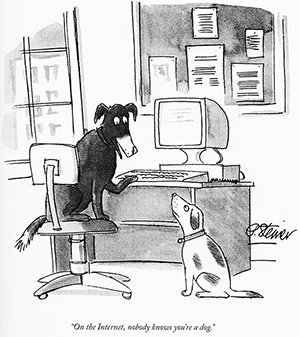
"On the Internet, nobody knows you're a dog": A popular cartoon indicating one's concealed ability on the Internet, implying that anyone, regardless of their knowledge, expertise or intentions, can make contributions to websites and sources of information; lack of expert/scholarly-backed up knowledge is one of the most pressing issues plaguing the Internet-information relation
Introduction
In the millennia-long history of human communication, arguably no development has been more influential—for better and worse—than the introduction and promotion of the Internet in the 1990s. Conceived towards the end of the Cold War, it quickly revolutionised the transmission of information among the public by making it more efficient than any book ever could. Whilst efficiency is universally thought of as a positive, the ability to access all human knowledge at the click of a button has wrought unintended issues which must be resolved before they become irrevocable and ingrained in the human species.
Misinformation
The facility of uploading information accessible to everyone has ironically spurred a wave of misinformation and manipulation of facts. The extensively well-researched volumes of Encyclopedia Britannica composed by renowned experts have swiftly been replaced by one website: Wikipedia, self-labelled as the ‘free encyclopedia that anyone can edit ’. ‘Anyone’ is not limited to qualified professionals; even the most ignorant and unlearned individuals can now edit articles held as the definitive source of knowledge. This trend extends to the entire Internet, as misinformation can be forged and posted for anyone to access, and those unlearned about the respective subject would have no reason to believe it is false.
Politically charged/ideological individuals often manipulate this lack of prior knowledge to push their own agenda, which is dangerous in a democratic society relying on citizens’ judgement of the political status quo. However, Internet facts about the status quo, dominated by biased media coverage, are often cherry-picked, distorted or downright fabricated representations of facts. Hence, it is no surprise that the term ‘fake news’ prevails in an age when information can be churned and consumed instantly by anyone, without regard for quality, whilst such a phrase would not have been dreamt of in a time of professional journalism.
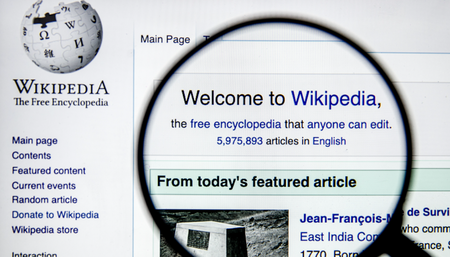
WIkipedia's status as 'the free encyclopedia that anyone can edit' has resulted in a slew of misinformation on the site
Lethargy/Ignorance
Besides the efficiency in transmitting information on the Internet, its unparalleled accessibility has rendered individuals more apathetic towards research and unperceptive about the type of information one consumes. The sheer expediency of educating oneself on a given subject from a few websites—which may very well be false—without having to spend hours in a library has made learning more efficient but, in turn, learners more impatient. Whilst the forgotten days of consulting piles of peer-reviewed books were gut-wrenching for many, at least they compelled people to care about quality research and verifiability in educative sources and gave them a longer attention span.
In modern times when comfort, not truth, is prioritised, many deem education as nothing more than watching a few TikTok videos by an unemployed nobody claiming to be an expert in the respective field of study. The accessibility of information, therefore, explains why students no longer have the patience to sit through a lesson and why they deem homework produced by the ‘sage’ ChatGPT to be acceptable. It seems that the Internet has covertly put millions of graduated scholars out of employment since their work is no longer esteemed in this comfort and efficiency-centred society.
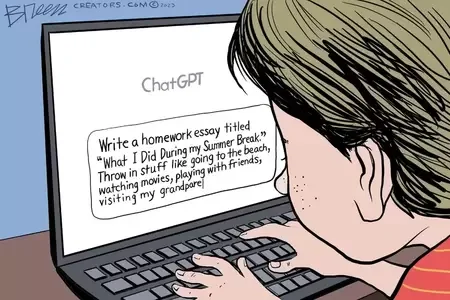
Cartoon displaying the overreliance of students on ChatGPT: the efficiency of using artificial intelligence in completing homework has blinding many of the rigour of conducting proper research
Resolving Misinformation
The problem of misinformation can be resolved by proper, professional education on distinguishing between facts and purported facts on the Internet. Although inconvenient for the government since media bias may be conducive to brainwashing citizens—indeed, the proof of the need for reform—curricula must be updated to include media literacy skills to combat this issue. In a world of misinformation, the one place guaranteed (supposedly) to educate students on the truth is school, and later, university. This, along with the influence schools have in fostering one’s understanding of the world, provides an opportunity for individuals to be educated from a young age on recognising verifiable information on the Internet.
The principle of proper research and fact-checking must be cultivated before one grows reliant on websites; for instance, primary/elementary school students must be taught about consulting multiple sources, recognising professional websites from amateur ones, and generally being sceptical about information on the Internet. More assignments could be given, offering the opportunity to learn about citation, consulting verifiable sources such as Google Scholar, and exercising other values on fact-checking. Most importantly, students must acknowledge the cruciality of media literacy and detect prominent biases in media news sources—currently not even mentioned in many national curricula.
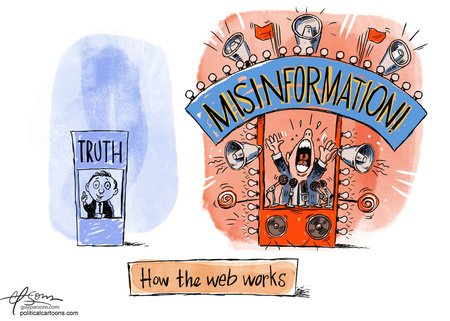
Cartoon displaying the prevalence of misinformation in the Internet and online media publications; these websites are 'louder' due to crafty techniques implemented, which the public can easily identify with modern curricula including media literacy skills
Resolving Lethargy/Ignorance
The aforementioned educational reforms should aim at making individuals conscious of the value of well-conducted research and thus should be complemented by imposing a preference for books and reading. The new generations, Z and Alpha, have grown up in a world of personal comfort, where work that would previously take hours now takes a few Google searches. To get them to acknowledge the necessity of reading—a far more reliable and complete source of information than the Internet—schools must first attempt to reverse the trend of children having alarmingly low attention spans.
One of the simplest remedies they, as well as parents, can offer is discouraging students from consuming short-form content such as TikTok, instead exposing them to full-length cartoons or documentaries entailed for children. Once their patience with media increases, they will become more inclined to use the Internet more prudently as an educative resource, such as relying on more than one website to source information on a given subject. It follows that curricula must place further emphasis on reading sessions and highlight the stark contrast between the verifiability of books and the unmitigated misinformation on the Internet. Fostering this mentality at a young age may lead to future generations appreciating the value of reading.
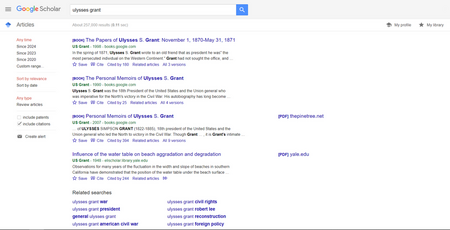
Screenshot of results from Google Scholar: an ideal resource for conducting proper research owing to its abundance of peer-review and well-cited publications
Conclusion
Whilst facilitating learning in certain aspects, the Internet’s legacy on the transmission of information is far from positive. Its development has led to the mass dissemination of misinformation, aggravation of media bias and widespread apathy towards reading and research. Action from schools is the only feasible solution to these issues, especially at a primary/elementary level, in educating students on identifying false information, biased journalism, conducting proper research and, above all, prizing reading as the superior source of knowledge.
Further Reading
For more information, one may consider consulting these sources; I primarily used these as sources in creating this blog.
- Brief history of the Internet
- Reliability of Wikipedia
- The Internet and education
- Proper research methods
- Future of Internet misinformation
- Full Report 1
- Full Report 2
_________________________________________________________________________________

Disinformation is the word of the decade, I say this as someone who now has to swell from hunger, ride carts and go to the toilet in a hole in the floor, and do all this under the muzzle of soldiers and the control of the FSB. Yes, there is a small percentage of misinformation here, isn't there? We literally live in a world where absolutely all media are shamelessly lying, from musty yellow newspapers to the largest media, and who is more is unknown.
Step 1: Join United Russia (largest party)
Step 2: Run for office
Step 3: Push a oligarch out a window (this step is for fun)
Step 4: promise…idk, pension increases?
Step 5: buy biggest local tv station and self promo
Step 6: remove competitors
Step 7: Voter fraud!
Step 8: democracy! You are now in power!
Step 9: Give who ever donated to your campaign preferential laws and tax cuts
Step 10: Jail any future competitors and repeat
(also get a child and make them ur heir and prepare for politics)
And so, learn to promise from the mayor of Lipetsk, although I think there are dozens of examples of your own in other countries. At least, even for us, it is nonsense to dry the reservoir for the sake of Samsung, but there is plenty of fun
People consider Wikipedia and other sister sites (like Wiktionary and all) accurate and factual, which they are usually, but not always. People do not realise that literally everyone can edit these articles and this could lead to problems, especially in controversial topics such as wars or politics.
Also, media literacy. It is extremely important to be media literate in this age where everything is done digitally. I'm linking this blog from one of my favourite bloggers about media literacy. Maybe you'd like it.